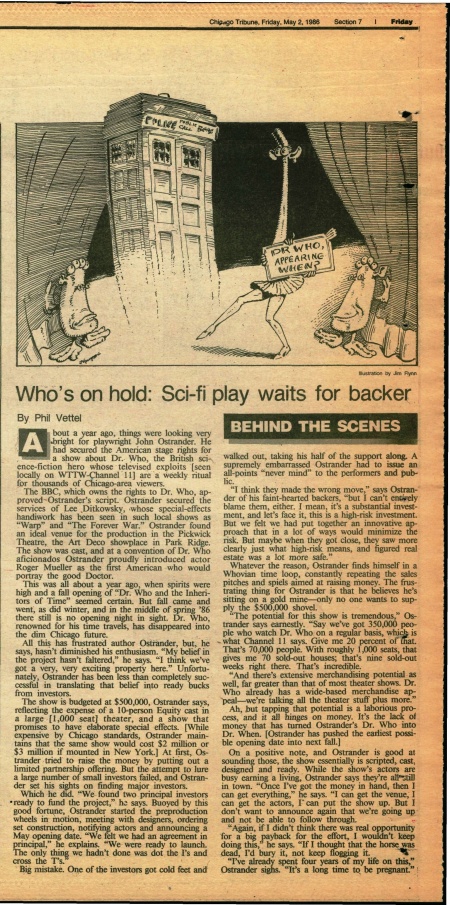Who's on hold
- Publication: Chicago Tribune
- Date: 1986-05-02
- Author: Phil Vettel
- Page: sec. 7, p. 1
- Language: English
About a year ago, things were looking very bright for playwright John Ostrander. He had secured the American stage rights for a show about Dr. Who. the British science-fiction hero whose televised exploits [seen locally on WTTW-Channel 11] area weekly ritual for thousands of Chicago-area viewers.
The BBC, which owns the rights to Dr. Who, approved Ostrander's script. Ostrander secured the services of Lee Ditkowsky, whose special-effects handiwork has been seen in such local shows as "Warp" and "The Forever War." Ostrander found an ideal venue for the production in the Pickwick Theatre, the Art Deco showplace in Park Ridge. The show was cast, and at a convention of Dr. Who aficionados Ostrander proudly introduced actor. Roger Mueller as the first American who would portray the good Doctor.
This was all about a year ago, when spirits were high and a fall opening of "Dr. Who and the Inheritors of Time" seemed certain. But fall came and went; as did winter, and in the middle of spring '86 there still is no opening night in sight. Dr. Who, renowned for his time travels, has disappeared into the dim Chicago future. All this has frustrated author Ostrander, but, he says, hasn't diminished his enthusiasm. "My belief in the project hasn't faltered," he says. "I think we've got a very, very exciting property here." Unfortunately, Ostrander has been less than completely successful in translating that belief into ready bucks from investors.
The show is budgeted at $500,000, Ostrander says, reflecting the expense of a 10-person Equity cast in a large [1,000 seat] theater, and a show that promises to have elaborate special effects. [While expensive by Chicago standards, Ostrander maintains that the same show would cost $2 million or $3 million if mounted in New York.] At first, Ostrander tried to raise the money by putting out a limited partnership offering. But the attempt to lure a large number of small investors failed, and Ostrander set his. sights on finding major investors.
Which he did. "We found two principal investors ready to fund the project," he says. Buoyed by this good fortune, Ostrander started the preproduction wheels in motion, meeting with designers, ordering set construction, notifying actors and announcing a May opening date. "We felt we had an agreement in principal," he explains. "We were ready to launch. The only thing we hadn't done was dot the I's and cross the T's.'
Big mistake. One of the investors got cold feet and walked out, taking his half of the support along. A supremely embarrassed Ostrander had to issue an all-points "never mind" to the performers and public.
I think they made the wrong move," says Ostrander of his faint-hearted backers, "but I can't entirely blame them, either. I mean it's a substantial investment, and let's face it, this is a high-risk investment. But we felt we had put together an innovative approach that in a lot of ways would minimize the risk. But maybe when they got close, they saw mow clearly just what high-risk means, and figured real estate was a lot more safe."
Whatever the reason, Ostrander finds himself in a Whovian time loop, constantly repeating the sale:, pitches and spiels aimed at raising money. The frustrating thing for Ostrander is that he believes he's sitting on a gold mine—only no one wants to supply the $500,000 shovel.
The potential for this show is tremendous," Ostrander says earnestly. "Say we've got 350,000 people who watch Dr. Who on a regular basis, which is what Channel 11 says. Give me 20 percent of that. That's 70,000 people. With roughly 1,000 seats, that gives me 70 sold-out houses; that's nine sold-out weeks right there. That's incredible.
"And there's extensive merchandising potential as well, far greater than that of most theater shows. Dr. Who already has a wide-based merchandise appeal—we're talking all the theater stuff plus more."
Ah, but tapping that potential is a laborious process, and it all hinges on money. It's the lack of money that has turned Ostrander's Dr. Who into Dr. When. [Ostrander has pushed the earliest possible opening date into next fall.]
On a positive note, and Ostrander is good at sounding those, the show essentially is scripted, cast, designed and ready. While the show's actors arc busy earning a living, Ostrander says they're all still in town. "Once I've got the money in hand, then I can get everything," he says. "I can get the venue; 1 can get the actors, I can put the show up. But 1 don't want to, announce again that we're going up and not be able to follow through.
"Again, if I didn't think there was real opportunity for a big payback for the effort, I wouldn't keep doing thus: he says. "If I thought that the horse was dead, I'd bury it, not keep flogging it.
"I've already spent four years of my life on this," Ostrander sighs. "It's a long time to be pregnant."
Disclaimer: These citations are created on-the-fly using primitive parsing techniques. You should double-check all citations. Send feedback to whovian@cuttingsarchive.org
- APA 6th ed.: Vettel, Phil (1986-05-02). Who's on hold. Chicago Tribune p. sec. 7, p. 1.
- MLA 7th ed.: Vettel, Phil. "Who's on hold." Chicago Tribune [add city] 1986-05-02, sec. 7, p. 1. Print.
- Chicago 15th ed.: Vettel, Phil. "Who's on hold." Chicago Tribune, edition, sec., 1986-05-02
- Turabian: Vettel, Phil. "Who's on hold." Chicago Tribune, 1986-05-02, section, sec. 7, p. 1 edition.
- Wikipedia (this article): <ref>{{cite news| title=Who's on hold | url=http://cuttingsarchive.org/index.php/Who%27s_on_hold | work=Chicago Tribune | pages=sec. 7, p. 1 | date=1986-05-02 | via=Doctor Who Cuttings Archive | accessdate=15 December 2025 }}</ref>
- Wikipedia (this page): <ref>{{cite web | title=Who's on hold | url=http://cuttingsarchive.org/index.php/Who%27s_on_hold | work=Doctor Who Cuttings Archive | accessdate=15 December 2025}}</ref>
